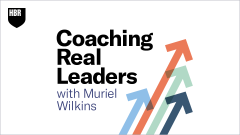MURIEL WILKINS: I’m Muriel Wilkins, and this is Coaching Real Leaders part of the HBR Podcast Network. I’m a longtime executive coach who works with highly successful leaders who’ve hit a bump in the road. My job is to help them get over that bump by clarifying their goals and figuring out a way to reach them, so that hopefully they can lead with a little more ease. I typically work with clients over the course of several months, but on this show we have a one-time coaching meeting focusing on a specific leadership challenge they’re facing.
Today’s guest is someone we’ll call Maggie to protect her confidentiality. She’s been at her company for several years and seen it through many phases of growth.
MAGGIE: I’ve had the somewhat unique experience, I would say, of being with the same organization for the majority of my professional career, and when I started with the organization I’m with today, it was truly a startup. So it has been an honor to be part of that ride, and I have professionally benefited from that growth, probably elevating five to six times over the course of that company growth into new roles, learning new skill sets, et cetera.
MURIEL WILKINS: But lately Maggie has been feeling a shift and less of a tailwind than she’s felt in the past when it comes to advancing in her career.
MAGGIE: We’re on the precipice of a new era of the company where it has to function differently. We have to build to scale. We’ve got new leadership coming in and I find myself asking the question, am I who this organization needs long term? Is there a place for me in this organization long term? And I really want to come to that decision on my own before I’m forced to. It’s just been a lot of self-reflection and trying to understand if this is the place for me long term and if I can provide value.
MURIEL WILKINS: As Maggie senses the shift happening all around her, she’s been doing a lot of self-reflection and reached out for coaching because she hopes to explore whether it will continue to be the right place for her and if she might still add value as the organization scales. To help her think about how she wants to move forward, I begin by asking about what got her here and how she thinks she’s added value so far.
MAGGIE: I’m really good at taking on new challenges and new growth, and so every moment of newness that the company faced, I always was able to figure out the pieces and parts to make that work, who to work with, how to build the scalable function and how to grow in that area. And so I see myself continuing to bring that, but I think that I’ve gotten to the point where obviously with the scale and size the company is getting to, there needs be a more refined leadership scope and I just don’t know if I am who that organization needs at that phase.
MURIEL WILKINS: Have you ever felt that before that you just didn’t know if you are what the organization needs? Because you’ve been there a while and you’ve gotten elevated a few times.
MAGGIE: This is the first time I’ve really felt it, and I don’t know if it’s because there’s a new wave of leadership or if it’s just the size that we’ve reached, we just function differently than we used to, but this is definitely the first time I’ve experienced it personally.
MURIEL WILKINS: And what is it exactly that you’re experiencing that’s different?
MAGGIE: I’m feeling a change in expectations. So as we were growing in the company, it’s almost like the way to grow was to take on more responsibility and more scope, and we’ve reached a size where it’s almost like there’s more value on specialization and being really focused on a particular area, which is different than what I’ve ever experienced before. So it’s because I’ve been there for so long, my hands are in a lot of things and I have a lot of experience there, but I don’t know what my direct path is.
I’m also experiencing because it’s a whole new regime, a lot of changing tides in conversations that I’m not in. And so I’m having trouble finding my footing of what is my path forward and where do I need to lean in to really be successful long term, and is that what I want to do? Do I want to be with this organization in the next phase?
MURIEL WILKINS: Okay. And in the past, how did you know what your path forward was?
MAGGIE: Truly it was we have this opportunity and we don’t have anyone to do it. And so I would just raise my hand for anything that was thrown at me.
MURIEL WILKINS: So you were like, “I’m here.”
MAGGIE: Yep, “I’ll do it.”
MURIEL WILKINS: “I’ll do it.” Okay. And what’s happening now?
MAGGIE: There’s less of that and there’s a lot of talent in the organization at the top. And so there’s less of these just things that are out there that need someone to take hold of and more of a, you need to really prove your value and serve the company in a really defined way where there’s guardrails.
MURIEL WILKINS: Okay. So I’m trying to understand whether you have gotten any indication from others around what your path might be or whether there is a path.
MAGGIE: In the new leadership, I have been given a path forward. It has changed probably three or four times, and it’s always felt like almost a surprise as it’s changing. I think there is a little bit of me looking inwardly of can I do the job that I’m being asked of because I don’t have outside perspective. I’ve been with the same company and now we’re functioning at a different level, and so can I service in that role that I’m being asked to do? And it’s a little scary. It’s almost like this is handed to me versus, “Hey, we need to solve for this problem and me volunteering for that.” So it’s been a different approach, I guess you would say.
MURIEL WILKINS: Okay. And what’s the difference, not in the approach, but what is the difference in terms of the way that you’re responding to the opportunities based on the difference in approach?
MAGGIE: Yeah. It’s a good question. I’m probably responding in the same way. If I see a problem in front of me, I really dig in and probably overwork to build out, “Hey, I can do this job,” and almost prove myself to the person. Maybe it’s that I’m getting less feedback that it’s what they need and so I’m not sure, am I hitting the mark? Am I not? And not getting that feedback from new leadership that I don’t know well, and that doesn’t know me well.
MURIEL WILKINS: Okay. And so what would that feedback give you?
MAGGIE: It would give me guidance that I am on the right path and probably give me more confidence that there is a seat for me in the long-term with the organization. There’s confidence that I can do the thing they’re asking of versus she’s been here for a long time, it would be noticed if she wasn’t here. Let’s just put her here for now, if that makes sense.
MURIEL WILKINS: Got it. So what I’m sensing is there’s a lot of, I don’t knows.
MAGGIE: Yeah.
MURIEL WILKINS: Right?
MAGGIE: That’s a good way to put it.
MURIEL WILKINS: And because you’re not getting that information from others, it’s then making you question whether there’s a path for you or not. And correct me if I’m off here, but it feels like because you’re not hearing there’s a direct path for you. There’s an insinuation that there might not be a direct path for you, which there could be other possibilities as to why you’re not hearing, “Here’s the direct path.” What other possibilities could that be?
MAGGIE: I mean, the other possibilities are they don’t know what it is yet. I sometimes equate the phase that we’re in right now of someone going to the doctor where the doctor is running all of these texts and asking all these questions to get to a diagnosis. We have a new regime of leadership that’s coming in and trying to understand the business, how it got here, what’s working, what’s not working, as well as bringing in their perspective of what has worked in other industry. And so there’s a lot of that happening, which means the remit is changing constantly as more information is gathered.
MURIEL WILKINS: And so there’s a little bit of… In what you just said, there’s a lot of change in people discovering right now because they are new to the company, which is really not personal, I guess, right?
MAGGIE: Yeah. I think you’re right.
MURIEL WILKINS: I don’t think they’re coming in and saying, “Oh my gosh, we don’t know anything about Maggie.” I think they’re coming in and saying, “We don’t know anything about this company. How do we get it on the right trajectory? We’re figuring it out in this discovery phase as they should.” And as a result of that, they may not be able to provide this clear guidance that you are craving for. And maybe the more they don’t give it, the more you want it. The more you want-
MAGGIE: That would be it.
MURIEL WILKINS: … them solidifying. So I think there’s two parts here. I think there’s the how do you manage this precipice chapter that you’re in because you’re not quite in the new era, right? You’re on the precipice, so how do you stand on the precipice? There’s that piece. And then there’s the, “What does the future look like for me?” And how do I… Back to your original question, “Do I have a place in whatever this next new era is? And do I even want a place in that new era?”
MAGGIE: Yeah.
MURIEL WILKINS: There’s two pieces and I think we were jumbling up both, but in order to be able to see the new era clearly or figure out how to deal with new era, clearly you’ve got to be able to stand on the precipice with strong footing.
MAGGIE: Yeah.
MURIEL WILKINS:
Okay?
MAGGIE: Yeah. I think you’re right.
MURIEL WILKINS: So let’s start with that and I’m going to ask you, what do you need to be able to be in this little season that you’re in? We’re calling it the precipice season. I’m imagining you actually standing on the precipice of something, so what do you need to feel like you have some strong footing there that’s in your control, by the way?
MAGGIE: Oh, see, that’s the tough part. I need constant accolades. What do I need? I think an understanding or an education of how companies at that size, our goal size function. Again, being with the same organization and seeing it grow, I only can look back and see how each stage of this company had functioned over the past decade. I don’t think I fully understand how a company at this scale and at our next scale works day to day and how all the pieces and parts come together. So I think that would be really helpful.
I think also understanding the vision of all the new leaders that are coming into the org. I think I’ve met all of them individually. I’ve had great conversations with all of them, but I don’t think they’ve even aligned on all of their individual visions for that kind of next step in growth. Knowing some of that would be helpful for me. And then also I think I need to figure out, to your point, things I can control. I need to figure out a way for me to reflect and measure if I’m being successful without hearing it directly from somebody.
MURIEL WILKINS: And that is in your control and that is this last piece that you said around how do I measure if I’m being successful without necessarily hearing it from someone? Again, I keep coming back to this image of standing on a precipice. It’s like knowing, “Yep, my two feet are still on the ground. That’s success.” Rather than waiting for the wind to shift me one way or the other or somebody else to tell me, “Oh, no, your two feet are on the ground.”
MAGGIE: Yeah.
MURIEL WILKINS: Right?
MAGGIE: yeah.
MURIEL WILKINS: So let’s start with that one because I think that that’s the one that you have the most control over. What would you need to do or look into to give you those measures of success that your two feet are still on the ground?
MAGGIE: I think maybe it’s just going through the exercise of, okay, what do I understand today of where the company wants to go? What do I understand today of the remit that’s kind of been drafted for me? What does success mean for that role? And then writing out what those metrics are to then determine, okay, how do I measure that? Is it in our systems? Is it through conversation? Maybe having some sort of roadmap that I can refer to on a daily basis and use as my north star could be helpful. I don’t know what else.
MURIEL WILKINS: I think that would be a great start because I think part of what’s happening is you’re sort of thinking about out there. You’re sort of like, “Oh my God. What’s happening? It’s in the future. I don’t know.” And what I’m asking you to do is look at your two feet. Are they still on the ground? Every few minutes, check down. Are the two feet still on the ground? Which translates into what you just said, is what I’m doing on a day-to-day basis or on a weekly basis, is it still adding value? Is there some success there?
And even if you don’t know if it’s what’s going to be valuable two months from now, a year from now, being able to determine, “Well, for today, this is success. How do I measure success today? What would make today a success? What would make this week successful? And let me track it.”
MAGGIE: Yeah, I’ve never thought about that starting the week to say, “Okay, it’s Monday. When I get to Friday, what are the things that I want to achieve by Friday that this week would be deemed successful?” And maybe thinking more shorter term. Then to your point, I feel like I’ve always tried to be the tip of the spear of the company and so I’ve always been like, “Okay. What is big picture we’re trying to achieve?” I think I need to rein that in a little bit. To your point, in the moment of change, since we don’t know all of those things.
MURIEL WILKINS: Exactly. I mean, look, I think it’s great that you’re strategic and you’re future-oriented and you think big picture. But when that’s nebulous, and it’s really not in your decision rights to figure out what that future is going to look like, that’s the new leadership. You can’t measure. And you’re asking for the impossible, which is, “I want to measure my success, but the things that I want to measure my success on are these nebulous things that don’t exist. And oh, by the way, I don’t really have any direction or say so in what that’s going to look like.”
So the question becomes then what do you do in the meantime until you get that clarity? And in the meantime, I mean, you’re there, you’re coming into work, you’re doing something, you get to lay out what you do in the short term. Focus on that just to make you feel like at least in the short term, in the precipice piece, you’re grounded. Okay?
MAGGIE: Yeah.
MURIEL WILKINS: So does that work? You think you’ll be able to do that?
MAGGIE: Yeah, I do. And I think I’ve used frameworks in the past for other initiatives where it’s like 30 days, 60, something like that, that’s even more shorter term I think would really help me in the day-to-day.
MURIEL WILKINS: Yeah. Just to bring you back to the basics.
Maggie is standing in the middle of a lot of change. Her company is evolving, roles are shifting, and she’s trying to make sense of where she fits. In moments like this, it’s common to feel the urge to move quickly to make a decision, just to regain control. But sometimes the most helpful thing isn’t to act right away. It’s to pause long enough to take stock of what’s really happening. This part of the conversation is about clarity. What’s actually changed around her? What’s still true about how she adds value? Without that grounding, it’s easy to react to the noise instead of the facts. As Maggie reflects on what’s right in front of her, the picture starts to come into focus. Not all at once, but piece by piece. Let’s jump back in as she begins sorting through what’s really shifting and what might just need a new perspective.
Let me ask you this, if new leadership were to come to you and say, “Maggie, you tell us what you want. Your wish is our command,” what would you say?
MAGGIE: Yeah, it’s a good question. Honestly, to their credit, there has been some of that. I keep going back to wanting to be somebody that’s thinking about the future state of the organization where it’s going. I really like to be client facing and to be large stage out there with the market. I also like to think about the vision of where the company is going. So I think there would be elements of all of those things. And I also very much pride myself on the ability to collaborate and connect across the organization. So understanding how the pieces and parts come together from a growth perspective and a positioning perspective.
So it would probably be elements of that. This goes back to what I talked about before if I don’t really know what the structure and org roles look like in larger organizations. So I think my scale and scope is probably way too large for a single role, but I haven’t gone through the exercise of chiseling that down to something more specific and measurable.
MURIEL WILKINS: By specific and measurable, what do you mean? What would that look like?
MAGGIE: I don’t know. I think it would look like something that would not have crossover across other areas of the organization like marketing or the divisions, or product or all of these different organizations. I think I’m just so used to being involved in everything that I need to probably challenge myself to think through what are the three things that I most enjoy doing and that I can provide the most value? And what does that role look like? And is that a role that this organization needs long term? And maybe that would give me some answers or direction.
MURIEL WILKINS: I mean, it’s interesting to me because I think what you just said now around you’re used to being involved in everything which is required when you’re in a startup. It’s like you want people who can roll up their sleeves and who can make the coffee and freaking put together the strategic plan all in one day.
MAGGIE: Exactly.
MURIEL WILKINS: Like they can do it all. And now I think what you’re seeing is that as a company scale, you don’t really need people who can do it all. I think it’s what you refer to as more specialization. And my question to you is if up until now you’ve defined your value as doing it all, what could be the new way that you could define your value that isn’t, “I do it all”?
MAGGIE:
I think that’s what I’ve been grappling with. I don’t know., maybe it comes back to being the person that people come to for a specific thing like the expert in an area. I don’t know.
MURIEL WILKINS: What is it that you don’t know?
MAGGIE: I don’t know how to grow in an organization and provide value if it doesn’t mean taking on more things.
MURIEL WILKINS: Okay. But do you hear how inherent in that is that you’re defining success and value as taking on more things?
MAGGIE: Yeah.
MURIEL WILKINS: Which is great for certain types of organizations for a startup. So you could certainly do that, right? And other types of organizations. But you’re attached to, “This is how I add value by taking on more things.” Right?
So like saying, “I can only play tennis with my forehand. That’s how I win.” And you certainly, you use your forehand, and there might be other ways of also winning. And so th





